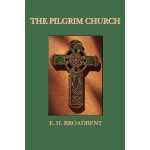The ekklesia that actually gathers in a location
Yesterday, I mentioned that I’ve been re-reading one of my favorite academic books on the church: Paul’s Idea of Community by Robert Banks (Peabody: Hendrickson, 2004). As you can imagine, Banks includes an extended discussion of Paul’s use of the Greek term ekklesia (usually translated “church” in English translations). In fact, two chapters focus on how Paul uses that term: “Church As Household Gathering” and “Church as Heavenly Reality.”
In the first chapter (“Church As Household Gathering”), he examines how Paul uses the term ekklesia in his earlier (chronologically) letters: 1-2 Thessalonians, Galatians, 1-2 Corinthians, and Romans. In these letters, Banks concludes that Paul only uses the term ekklesia to refer to groups of believers who actually gather together in a locality.
What is Paul’s early usage of the term ekklesia, church? He first uses the term in his greeting to the Christians in Thessalonica (1 Thess 1:1). Here he is using it in the same way as in Greek and Jewish circles and yet is consciously distinguishing the “assembly” to which he is writing from others in the city. It is clear from the closing remarks of the letter that Paul has in mind either an actual gathering of the Thessalonian Christians or the Thessalonian Christians as a regularly gathering community…
Elsewhere in these letters [1-2 Thessalonians] we have reference to other Christian gatherings only in the plural, viz., to “the churches of God” generally and to “the churches of God” in Judea specifically (2 Thess 1:4; 1 Thess 2:14). This suggests that the term is applied only to an actual gathering of people or to the group that gathers as a regularly constituted meeting and not, as today’s usage, to a number of local assemblies conceived as part of a larger unit. (pp 29-30)
Banks offers other evidence, such as Paul’s reference to the plural “churches in Galatia,” “churches of Asia,” and “the churches of Macedonia.” (Gal 1:2, 1 Cor 16:1, 1 Cor 16:19, 2 Cor 8:1) Similarly, he discusses Paul’s reference to “the whole church” in Corinth – indicating that the believers in Corinth did all gather together at some point, thus they could be referred to as “the church in Corinth,” and also indicating that believers in Corinth gathered together in smaller groups which would also be referred to as “church” (otherwise the term “whole” would be unnecessary).
On the other hand, since Paul does not refer to “the church in Rome,” but instead only refers to individual gatherings in Romans 16, then this indicates that the believers in Rome did not all gather together at one time.
Concerning the various groups in Rome, Banks writes:
This probability is confirmed by Paul’s comments in Romans 16 about various Christian groups in the capital. There is no suggestion that Christians ever met as a whole in one place [in Rome]. (Indeed, as much as a century later, Justin remarks that this is still the case!) Presumably this is due to the size of the city. (pg 32)
So, if I understand what Banks is saying, Paul could refer to “the church in Thessalonica,” “the church in Corinth,” etc. because the believers in those cities actually gathered together at some point. In the same way, he could refer to “the church that meets in [Priscilla and Aquila’s] house” (in Rome – Romans 16:5) because those believers actually gathered together at some point.
However, Paul would not have referred to the believers in Rome or Galatia or Judea as “the church” in those locations because the believers in those locations did not all gather together at some point.
In my post tomorrow, I’m going to introduce another way that Paul used the term ekklesia in his later letters (according to Banks).
But, for now, what do you think of Banks suggestion that Paul would only use the term ekklesia when referring to believers who actually gather together? (Remember, Banks is only examining Paul’s use of that term in 1-2 Thessalonians, Galatians, 1-2 Corinthians, and Romans at this point.)
For Paul, freedom means independence, dependence, and interdependence
Lately, I’ve been re-reading one of my favorite academic books on the church: Paul’s Idea of Community by Robert Banks (Peabody: Hendrickson, 2004). Like almost any book, there are both positive and negatives aspects – strengths and weaknesses. But, this book has a special place in my own heart.
Why is this a special book for me? This is one of the first books that I read in which I was encouraged that my understanding of the church could be presented in both popular and academic formats. There have been several other books since then, but this was one of the first.
Chapter names like these would persuade most of my blog readers that I would like this book (and they would be right): “Church as Household Gathering,” “The Community as a Loving Family,” “The Community as a Functional Body,” “Physical Expressions of Fellowship,” “Gifts and Ministry,” “Charisma and Order,” and “Unity in Diversity among the Members.”
But, this time, as I read through the book again, I was intrigued by Banks’ description of salvation as freedom (in Paul’s writings). I especially enjoyed this summary:
To summarize, freedom for Paul consists of three main components:
Independence
- from certain things, e.g., sin, the Law, death, and alien powers
- for certain things, e.g., righteousness, conformity to Jesus, suffering
- resulting in a personal and life-giving experience of liberty.
Dependence
- upon Christ, who terminated humanity’s enslavement through his death and resurrection
- upon the Spirit, who communicates Christ’s life and purpose as a received divine gift rather than innate possibility.
Interdependence
- with others, since liberty leads to service and can only be practically defined in relation to their needs
- with the world, since the universe itself will experience the liberty of transformation along with those who are Christ’s
- giving liberty a social and cosmic, as well as a personal and theocentric, dimension.
(page 25)
Our relationship with one another as the family of God (the church) is definitely based on the person and character of God himself. In the same way, however, our relationship with one another is also based on the salvation (and resulting freedom) that we have in God through Jesus Christ enacted by the Holy Spirit. Thus our salvation and our freedom are personal, but not only personal; it is also mutual and communal, in the sense that our connection with God is also interconnection with one another.
When we are set free from (independent of) our sin, we also become dependent on Jesus Christ and the Holy Spirit and interdependent with one another.
Most of us (and I included myself in this) focus on one aspect of salvation (freedom, as Banks describes it above). We focus on being set free from sin. Or we focus on our dependence on God. Or we focus on our interdependence with one another. But, a more complete understanding of salvation (freedom) would include all three aspects of independence, dependence, and interdependence as listed above.
Which of the three aspects of freedom/salvation listed above (independence, dependence, interdependence) do you think you primarily focus on? Do you see any benefit in including all three in our understanding of salvation/freedom?
Books for Sale
I need to get rid of some books for two reasons: 1) We need to clean off some bookshelves, and 2) we need the money more than we need a bunch of books lying around.
As I clean off more shelves, I’ll probably list other books for sale. But, this is a start.
Most of my books are listed on Amazon here: “AssemblingBooks.”
The following books are not on Amazon. If you’re interested in the books below, leave a comment or send an email to aknox [at] sebts [dot] edu. I’ll reply in an email.
By the way, I’ve included links to each book on Amazon in case you want to know more about it. Yes, I will have to charge for shipping, unless you’re close enough that I can meet you somewhere. And, yes, I’ll be glad to make a deal if you buy multiple books.
The Biblical Canon: Its Origin, Transmission, and Authority by Lee Martin McDonald (ISBN: 978-1-56563-925-6)
The Church Before Christianity by Wes Howard-Brook (ISBN: 1-57075-403-9)
The Colors of Hope: Becoming People of Mercy, Justice, and Love by Richard Dahlstrom (ISBN: 978-0-8010-1356-0)
Eat This Book: a conversation in the art of spiritual reading by Eugene H. Peterson (ISBN: 978-0-8028-2948-1)
Ethnic Blends: Mixing Diversity into Your Local Church by Mark Deymaz and Harry Li (ISBN: 978-0-310-32123-1)
Exploring Ecclesiology: An Evangelical and Ecumenical Introduction by Brad Harper and Paul Louis Metzger (ISBN: 978-1-58743-173-9)
The Expositor’s Greek Testament (5 volumes) (ISBN: 1-56563-029-7)
MacArthur New Testament Commentary
Matthew 1-7 (ISBN: 0-8024-0755-2)
Matthew 8-15 (ISBN: 0-8024-0763-3)
Matthew 16-23 (ISBN: 0-8024-0764-1)
Matthew 24-28 (ISBN: 0-8024-0765-X)
Acts 1-12 (ISBN: 0-8024-0759-5)
Acts 13-28 (ISBN: 0-8024-0760-9)
Romans 1-8 (ISBN: 0-8024-0767-6)
1 Corinthians (ISBN: 0-8024-0754-4)
Ephesians (ISBN: 0-8024-2358-2)
Philippians (ISBN: 0-8024-5262-0)
Colossians & Philemon (ISBN: 0-8024-0761-7)
1 Timothy (ISBN: 0-8024-0756-0)
2 Timothy (ISBN: 0-8024-0757-9)
The Meaning of the Dead Sea Scrolls: Their Significance for Understanding the Bible, Judaism, Jesus, and Christianity by James VanderKam and Peter Flint (ISBN: 0-06-068464-X)
The Ragamuffin Gospel by Brennan Manning (ISBN: 978-1-59052-502-9)
Soar: Are you ready to accept God’s Power? by Kenny Luck (ISBN: 978-1-57856-989-2)
Synopsis Quattuor Evangeliorum (&C 1964 by Wurttembergische Bibelanstalt Stuttgart)
When the Church Was Young by Ernest Loosley (Published by The SeedSowers)
Again, if you’re interested in any of the books above, leave a comment or send an email to aknox [at] sebts [dot] edu. I’ll reply in an email.
The Pilgrim Church: The whole church cannot be seen and cannot act in any one place
Yesterday, in a comment on another post, Chuck from “Being Filled” mentioned a book that I had not heard of before but which is available free online: The Pilgrim Church by E.H. Broadbent.
The book has the following subtitle: “Being some account of the continuance through succeeding centuries of churches practising the principles taught and exemplified in the New Testament.”
Unfortunately, I haven’t had time to read much of this book, but I did read a page or two. And, at the very beginning (the third and fourth paragraph), I read this:
As this body, the whole Church of Christ, cannot be seen and cannot act in any one place, since many of its members are already with Christ and others scattered throughout the world, it is appointed to be actually known and to bear its testimony in the form of churches of God in various places and at different times. Each of these consists of those disciples of the Lord Jesus Christ who, in the place where they live, gather together in His Name. To such the presence of the Lord in their midst is promised and the manifestation of the Holy Spirit is given in different ways through all the members (Matt. 18.20; 1 Cor. 12.7).
Each of these churches stands in direct relationship to the Lord, draws its authority from Him and is responsible to Him (Rev. 2 and 3). There is no suggestion that one church should control another or that any organised union of churches should exist, but an intimate personal fellowship unites them (Acts 15.36).
Like I said, I haven’t read much more than this in the book, but I have an idea that this quote tells us quite a bit about the focus of Broadbent’s book (the lack of “organized union of churches” for example). So far, I like his foci:
- Believers that are scattered around the world.
- All disciples of Jesus Christ in one area united together.
- Each church under the authority of Jesus Christ alone.
- A church connected to one another through fellowship and relationships.
Of these various concepts, I only see the first one actively displayed today. We recognize generally that believers are scattered around the world. But, we rarely see all disciples in one are united together, acting under the authority of Jesus Christ alone, and connected to one another through fellowship and relationship.
In fact, while we recognize believers scattered around the world today, we typically accept that we are also scattered locally as well. And, for the most part, we’re happy with that.
You see, when Broadbent writes, “[T]he whole Church of Christ cannot be seen and cannot act in any one place,” he means that we are scattered around the world. But, today, we would have to say that “the whole Church of Christ cannot be seen and connection act in any one place” – in any one location – because we are divided from one another and refuse to unite in the Spirit of God.
It makes me wonder… whatever divides me from brothers and sisters in Christ is something that I’m submitting to instead of submitting to God.
What books about the church have you enjoyed reading?
I’ve read many books about the church. I got something out of almost all of them that I’ve read. (Actually, I may have gotten something out of all of them, but I’m not certain… so I said “almost all.”)
I’ve read books that were written from a more organic/simple perspective, and I’ve read books that were written from a more institutional/organizational perspective. I’ve read books about the church from the perspective of many different denominations and philosophies and religious traditions. Again, I’ve learned something from them, and I’m glad that I’ve read widely when it comes to the church.
My friend Eric at “A Pilgrim’s Progress” gave us his list of “Top Ten Books About The Church” last week. This is his list (in alphabetical order):
Biblical Church
The Church: One, Holy, Catholic, and Apostolic
House Church: Simple, Strategic, Scriptural
Mere Churchianity
Pagan Christianity?
Reimagining Church
Total Church: A Radical Reshaping Around Gospel and Community
What is the Mission of the Church?
When the Church Was a Family
Your Church is Too Small: Why Unity in Christ’s Mission Is Vital to the Future of the Church
He also includes the following as “honorable mentions”:
Brothers, We Are Not Professionals
Finding Organic Church
Houses That Change the World
The Jesus Paradigm
The Normal Christian Church Life
Outgrowing the Ingrown Church
The Rabbit and the Elephant
I’ve read most of these books, and I agree that they are all good in their own way.
But, now, Eric is asking for our help. He’s asked, “What’s Your Favorite Book About the Church?”
In a comment on his post, I added the following to his list: Peterson’s Engaging With God, Banks’ Paul’s Idea of Community, and Girard’s Brethren, Hang Loose and Brethren, Hang Together. I also later agreed with other commenters that Bonhoeffer’s Life Together and some of Snyder’s books are very good. (Yeah, you knew that I couldn’t just offer one book, right?)
But, what books would you add to the lists above? What books about the church have you enjoyed reading? Which books have challenged your thinking (in a good way) even if you disagreed with the author?
Share some books here, then jump over to Eric’s post and share them with him as well.
Free copies of The Jesus Paradigm and Will You Join the Cause of Global Missions
Energion Publications is giving away two books by Dave Black: The Jesus Paradigm and Will You Join the Cause of Global Missions? You can find information about the giveaway and how to have a chance to win here: “Free Copies of The Jesus Paradigm.”
In fact, Henry – the publisher – says that he is giving away FIVE copies of each book. So, you have a pretty good chance of winning.
I have read The Jesus Paradigm and loved it! I’ve written a few articles about that book here on my blog. (If you’re interested, you should be able to find links in the “Related Posts” list after this post.)
I have not read Will You Join the Cause of Global Missions? yet, but it is probably just as good as Black’s other books.
Jump over to the Energion Publications post, leave a comment, and wait to hear the good news.
Replay: Autonomous Churches?
Five years ago, I wrote a post called “Autonomous churches.” It was a follow-up to a post called “Autonomous individuals.” In Christ, we are not autonomous, either as individuals or as groups of believers. Instead, we are intimately and intricately connected to one another by the Holy Spirit that indwells us. Unfortunately, today, it seems that many specialize in separate and distinguish between followers of Jesus instead of maintaining the unity of the Holy Spirit.
———————————
Autonomous churches
In my last post, “Autonomous individuals…“, I began discussing a book by Abraham J. Malherbe called Social Aspects of Early Christianity (Baton Rouge: Lousiana State University Press, 1977), specifically his chapter called “House Churches and Their Problems”. In my last post I discussed how the early Christians saw themselves as part of an extended household – a family. But, how did these early Christian “households” relate to other Christian “households”?
Malherbe continues:
As the church grew in a particular locality, more than one house church would be formed. The scarcity of information on the house churches in the first century precludes our having a clear understanding of their interrelationship. Paul seems to have known of at least three such churches in Rome (Rom. 16:5, 14, 15), and there may have been more than one group in Thessalonica (1 Thess. 5:17) and also in Laodicea (Col. 4:15). Although they may have formed separate communities, such groups were not viewed as being separate churches. Luke’s description of the church in Jerusalem is not clear on this point, but it does convey the impression that he thought of it as one church despite the smaller groups that composed it. This is supported by his (and the Pastoral Epistles) relating presbyters, or bishops, to cities rather than to individual groups (Acts 14:23; 20:17; Titus 1:5). By that time, however, more than one house church would presumably have existed in most localities with which the literature is concerned. More significant is that Paul and his followers, although they knew of separate groups in an area, wrote one letter to the church in that immediate area, apparently on the assumption that it would suffice for all the groups (e.g., Romans). On this understanding, the individual house churches would together have represented the church in any one area. [70]
Malherbe recognizes, as Scripture indicates, that there were different groups of Christians in a particular area (city). But, these groups did not consider themselves separate or distinct from other groups in the area. Instead, they considered themselves to be part of the same church. Also, Paul and others outside a particular city recognized all of the believers – and all of the groups of believers – in that city to be part of the same church.
As God formed the believers into households, He did not form them into exclusive households. Just as individuals now recognized that they were part of something bigger than themselves, the individual groups of believers also recognized that they were part of something bigger than that group. Thus, it seems from Scripture, that the distinct groups in a location – while recognized by themselves and others as a church – did not see themselves as truly distinct from other groups of believers in that same location. In fact, they also recognized a connection – though perhaps a looser connection – with other groups of believers in more distant locations. For this reason, Paul could label each group of believers meeting in a home as a church, but he could at the same time label all of the believers in a city as a church.
An autonomous church did not exist in the early days of Christianity. In fact, Paul reminds the believers in Corinth of this several times in his first letter to them. In 1 Cor. 1:2, he reminds his readers that they are not alone, but “together with all those who in every place call upon the name of our Lord Jesus Christ”. (ESV) Similarly, Paul reminds them that all the churches share common beliefs, activities, and teachings (4:17; 7:17; 11:16; 14:34; 16:1). The church in Corinth – even the church at the city level – was not an autonomous church, but was to recognize itself as being in relationship with the wider church throughout the world.
Similarly, in Romans 16, Paul expects and encourages the various “home churches” in that area to greet one another, recognizing some level of association between the different groups since the “greeting” was certainly more than a wave or a handshake. Thus, as the believers from different groups encountered one another – either in an intentional or unintentional meeting – they recognized themselves as part of the same church, not as members of distinct churches with little to no relationship between the two groups.
Invariably, when this idea of multiple groups (churches) recognizing themselves as one church is suggested, the question of leadership and control arises. If the different groups are a single church, then who is the leader? Who is in control? Who is responsible for the “meeting”? To me, these questions indicate a lack of understanding of biblical leadership. Biblical leadership is not about control, but about service. The leader is the one who serves. Thus, the true leaders are not concerned with being in control, but with serving others.
Similarly, this idea does not mandate a city-wide hierarchy of leadership. Instead, it mandates humility, gentleness, patience, love – in fact, the whole fruit of the Spirit – in accepting others and treating others as members of the same body – which we are, whether we accept it or not.
The people that meet in the building down the street – those people that we like to make fun of – they are our brothers and sisters. The people that meet across town – those people with the strange practices – they are part of the body of Christ with us. The people that rent the school auditorium – those people who are a little louder/quieter than we like – they are part of our church. We do not do service to the body of Christ by separating ourselves from other brothers and sisters who may be different from us. Instead, we demonstrate our love for one another by reaching out to one another, serving one another, accepting one another, learning from one another, especially when those “one anothers” look or act differently than us.
The autonomous church is not found in Scripture. Instead, the church in the New Testament recognized its mutual relationship with other believers in their area and their mutual need of one another (interdependence), despite their differences. And, where the believers did not think they needed each other, the biblical authors wrote against those practices and teachings.
Replay: The Church as Relational Organism
More and more, as I read books about the church, authors are recognizing that in Scripture the church is not an organization or an institution, but people. Four years ago, I wrote a post called “The Church as Relational Organism.” In that post, I referred to a few quotes from a book that I was reading at the time. The author was emphasizing the relational aspect of the church.
This is more than rhetoric. If we truly view the church as relational instead of organizational, it will change the way that we interact with one another.
——————————-
The Church as Relational Organism
A few days ago, in a post called “What is a ‘traditional’ church?“, I mentioned a new book that I was reading: Missional House Churches: Reaching Our Communities with the Gospel (Colorado Springs: Paternoster, 2007) by J.D. Payne. Primarily, I picked up this book because of the title and because it was written by a Southern Baptist. I haven’t read much concerning “missional” or “house” church from the perspective of other Southern Baptists, so I was intrigued by this combination.
Overall, I liked this book. As with almost all books, the author and I hold differing opinions on a few things. For example, when he is defining the Church/church (he uses “Church” for “universal church” and “church” for “local church”), I think he makes more of a distinction between “universal” and “local” than Scripture makes.
However, I appreciated his organic and relational definition of the church (I will use one term for both, like Scripture does):
What is clear from the Gospels is that Jesus came to establish a new community… The citizens of this new community were part of a divine kingdom and lived according to the kingdom of ethic that involved 1) love for the King, 2) love for others in the kingdom, and 3) love for those outside the kingdom. (26-27)
For the most part, the church today is defined and understood in institutional and compartmentalized concepts… On the other hand, the Scriptures advocate that the church… is primarily understood in relation to the kingdom of God through organic metaphors emphasizing 1) the relationship of believers to God, 2) the relationship of believers to one another, and 3) the relationship of believers to unbelievers. The church is primarily to be understood in simple relational terms. (35-37)
Similarly, when Payne discusses the various metaphors that the authors of Scripture use to describe the church, he begins with my favorite metaphor – the family:
The obvious meaning behind this metaphor is that the bonds holding together the citizens of the kingdom are as strong, if not stronger, than the bond of blood. Just as an earthly family loves, honors, protects, encourages, and cares for one another, the church must do likewise. (29-30)
My thinking about the church changed drastically when I began seeing the church as a family instead of seeing the church as an organization. I began interacting with people through the relationships that God created through his Spirit instead of interacting with people through positions and functions. We are brothers and sisters with the same father. That relationship is stronger than blood.
But how do I return to church?
This post is part of a short series based on Jeremy Myer’s (from “Till He Comes“) book project “Finding Church.” Jeremy asked for contributions in the categories of Changing Church, Leaving Church, Reforming Church, and Returning to Church. As I worked through my own contribution, I realized that my story could fit into any of the categories. So, I’m writing a post based on each category.
This post describes my experience “returning to church.” This is the hardest category for me to write about, because my story fits into this category less than the others. This is how Jeremy describes the category of “Returning to Church”: “These are stories of people who returned to church after years of being away.”
Why is it difficult to fit my own journey into this category? Well, as I wrote in the other posts (“changing churches,” “leaving church,” and “reforming the church“), I have left the idea of church as organization, institution, or hierarchy – I’ve left any “church” other than church as God’s people gathered together. I am not returning to this kind of “church.”
Also, as I explained in the other posts, when I was saved by Jesus Christ, welcomed into God’s family, and indwelled by the Holy Spirit, I became part of the church that is the gathering of God’s people, the body of Christ, the temple of the Holy Spirit. I cannot leave this church, which means that I cannot return to this church either.
So, how is “returning” part of my journey at all? Well, there is one way…
While I am not returning to the organizations and institutions that are often referred to as “church,” I can return to the believers who remain part of those organizations. As I’ve written previously, these believers are my brothers and sisters in Christ just as much as those who are not part of the organizations and institutions. When I share my life with “one another,” that must include them, or I am the one being divisive.
Of course, there’s always the chance that those brothers and sisters in Christ will not want anything to do with me. They may not want to fellowship with me. They may decide to separate from me. There is nothing that I can do about that. Instead, it must be my desire to fellowship with them and live in peace with them. And, I must be ready and willing to “return” to them at any point they may be ready. Or, if I find that I have been the one separating from them, then I must be willing to humble myself, admit my own divisiveness, and “return” to them.
All who are in Christ are part of the family of God together. We are all part of the body of Christ. We are all indwelled by the Holy Spirit. Too many things historically, culturally, organizationally, etc. separate us from one another. It’s time to “return” to one another and, as Paul wrote, be “eager to maintain the unity of the Spirit.” (Ephesians 4:3 ESV)
Let’s return to our brothers and sisters in Christ… all of them.
Reforming the church… Reforming us all together
This post is part of a short series based on Jeremy Myer’s (from “Till He Comes“) book project “Finding Church.” Jeremy asked for contributions in the categories of Changing Church, Leaving Church, Reforming Church, and Returning to Church. As I worked through my own contribution, I realized that my story could fit into any of the categories. So, I’m writing a post based on each category.
This post describes my experience “reforming church.” This is the topic that I wrote about, and perhaps Jeremy will decide to use my submission. (This post is not my submission, but some thoughts about this topic.) This is how Jeremy describes this category: “Though many people have painful experiences in church, some people choose to stay at their church and try to work through them, reforming the church from the inside, and being the change they want to see. These are their stories.”
As usual, I have to put my own spin on this topic. As I’ve already explained in my previous two posts in this series (“changing church” and “leaving church“), church is not a building, or organization, or event, or hierarchical leadership. Church is the people of God – the body of Christ – the temple of the Holy Spirit – gathered together.
So, did I write about this topic because it is my goal to reform organizations or institutions? Absolutely not. Like I said, those things are not the church. If the organizations change to better facilitate the church (the people) involved, that’s fine. But that’s not my purpose, and it’s not the type of reform that I’m interested in.
What can of reform am I interested in? The kind of reform that Paul writes about in Ephesians 4 when he says that the entire body of Christ works together so that the body builds itself up in love – this is reforming the church. It’s the kind of reform that he also wrote about in Colossians 3 when he said that as we all teach and admonish one another as the word of Christ dwells in us all – this is reforming the church.
I’m interested in the kind of reform that Peter wrote about in 1 Peter 4 when he says that we speak to one another and serve one another in order to glorify God – this is reforming the church. I’m talking about the kind of reform that we read about in Hebrews 10 when the author exhorts his readers to consider how to stir up love and good works in one another – this is reforming the church.
This kind of reform is a mutual work as God works through each of his children to help each other grow and mature and love and hope and trust and serve and speak. This is the kind of mutual church reform I’m interested in.
Have you experienced this kind of church reform?










